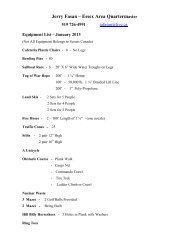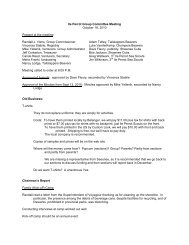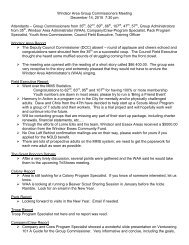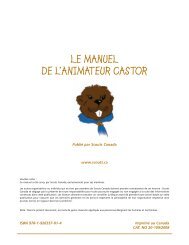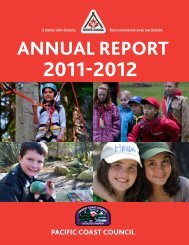Beaver Leader's Handbook - Scouts Canada
Beaver Leader's Handbook - Scouts Canada
Beaver Leader's Handbook - Scouts Canada
You also want an ePaper? Increase the reach of your titles
YUMPU automatically turns print PDFs into web optimized ePapers that Google loves.
2-2<br />
We have a duty of care to keep youth members safe and protect them from physical and emotional<br />
harm. In adventurous activities, this duty is exercised through sensible risk management.<br />
In our general program activities, this duty is exercised through a respectful, caring, empathetic<br />
and friendly relationship with young people. In the recruitment and selection of adult leaders,<br />
their personal standards, character and ability to develop this relationship is much more important<br />
than any technical skills or experience.<br />
1. Encouraging Positive Behaviour (Discipline)<br />
Occasionally, there may be a necessity for appropriate disciplinary action. <strong>Scouts</strong> <strong>Canada</strong><br />
encourages positive reinforcement to correct inappropriate behaviour.<br />
The following examples are inappropriate discipline methods:<br />
4 Physical blows or force 4 Emotional/humiliation/name-calling<br />
4 Confinement 4 Any other form of abuse.<br />
Alternatives to Punishment<br />
If we allow <strong>Beaver</strong>s to experience the consequences of their actions, there is potential for an<br />
honest and real learning situation to occur. Discipline can be maintained through both natural<br />
and logical consequences.<br />
Natural consequences represent the pressure of reality without interference. Disrespecting<br />
others, for example, will ordinarily invite similar treatment. But it isn’t always appropriate to<br />
let natural consequences take their course.<br />
Logical consequences involve an intervention by someone else. So, disrespecting someone carries a<br />
consequence, like removal from a program activity. The disadvantage, of course, is that this can<br />
deteriorate into another form of punishment imposed externally. Logical consequences should be<br />
negotiated as much as possible beforehand by everyone involved. Thus, an agreement is reached<br />
as to the consequences of foul language or put-downs (Code of Conduct). Because everyone is part<br />
of the agreement, everyone is also responsible for seeing that it works. By adults and youth taking<br />
responsibility together, logical consequences become an alternative to punishment.<br />
2. Physical Contact<br />
When dealing with youth, there is acceptable touching and<br />
unacceptable touching. A handshake is generally acceptable;<br />
a hug is sometimes acceptable; and an embrace is usually<br />
unacceptable. Touching which gives offence or causes any<br />
unease is not acceptable.<br />
3. Relationships<br />
<strong>Scouts</strong> <strong>Canada</strong> affirms a duty to its youth members for their<br />
welfare and development. Adults accept a responsibility to<br />
<strong>Scouts</strong> <strong>Canada</strong> to care for youth members and deliver the program.<br />
Adults enjoy Scouting and benefit from the training and<br />
experience it brings.<br />
However, adults are deliverers of the program. It is the youth<br />
members who are entitled to the benefits and protection of a<br />
safe, quality Scouting program. The correct relationship between<br />
an adult and a youth member is that of the adult being an instructor,<br />
guide, dispassionate friend and protector. It is a position of<br />
integrity, trust and maturity.



